Welcome to the week.
Here are the most notable stories our community came across in the past seven days…
More youth e-bike laws: A California rep from San Diego County wants to ban e-bikes for the 12 and under set and require state-issued IDs and a riders test to get one before hopping on for everyone else. (Rancho Santa Fe Review)
Decriminalize jaywalking: Washington did a statewide analysis of people stopped by police for crossing streets in an illegal way and found disturbing trends in who gets stopped, how they are treated by police, and other things that show legal reform around “jaywalking” cannot happen soon enough. (Streetsblog USA)
Mr. Transit speaks: Portland-based transit expert Jarret Walker has published a new update of his excellent book, Human Transit, and one of America’s foremost transit journalists asked him excellent questions about it. (Bloomberg City Lab)
Autopilot death machines: A man accused of hitting and killing someone with their Tesla told investigators he might have been driving on autopilot and checking emails when it happened. Disgusting regulatory failure! But yes, let’s make sure to regulate kids riding e-bikes ASAP! (Star Tribune)
Equity and traffic death: Road safety advocates in NYC say that city’s Vision Zero program is working — but only in neighborhoods where more white people live. In some parts of the city, the death toll is actually going up. (Gothamist)
Drive-thru dangers: The proximity of a major biking and walking path spurred council members to pass an ordinance that bans drive-throughs and gas stations in Atlanta. (11 Alive)
Cost of (heavy) cars: Another reason many of us are concerned about e-cars is because of their increased weight. Now there’s a study showing how costly and dangerous it is for all of us when these heavy vehicles hit roadway infrastructure like guardrails. (Slate)
Robotaxi outrage: A crowd vandalized, destroyed, and then set ablaza a robotaxi operated by Waymo in San Francisco over the weekend. A reader who shared this with us said it might have been in response to an earlier collision with a bicycle rider. (San Francisco Standard – Reuters)
Thanks to everyone who sent in links this week. The Monday Roundup is a community effort, so please feel free to send us any great stories you come across.



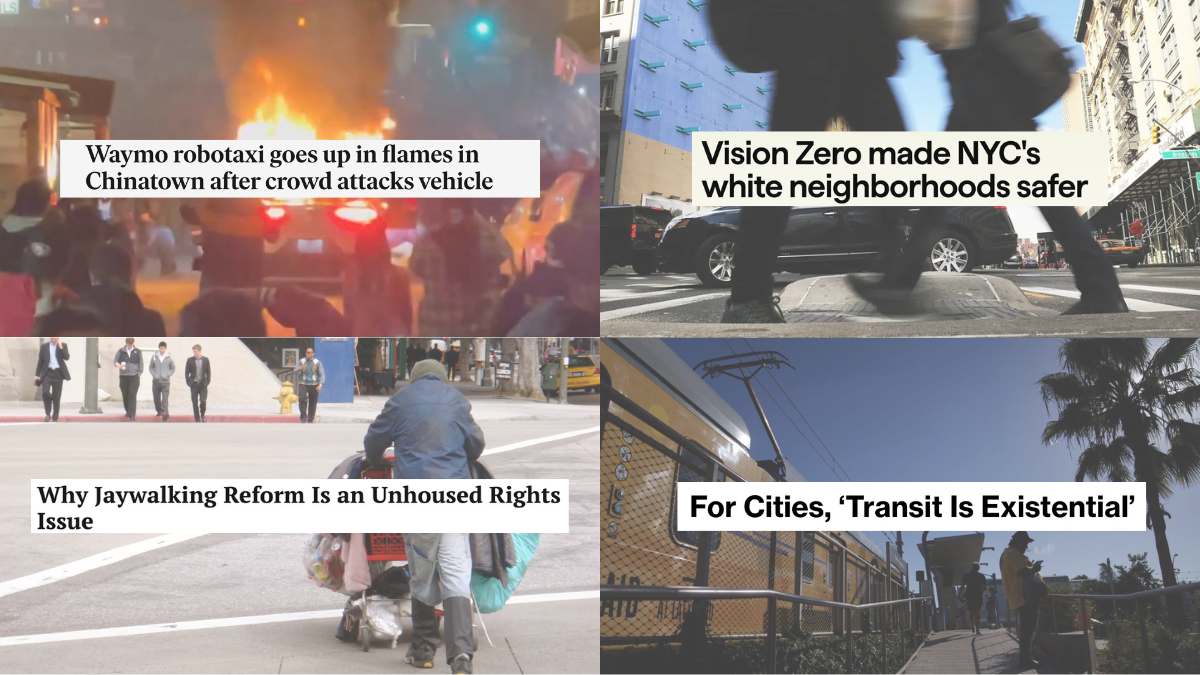
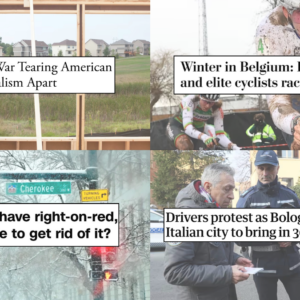
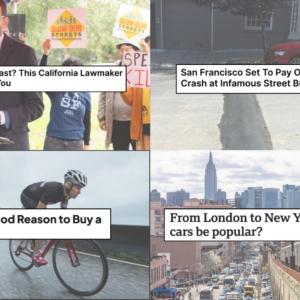
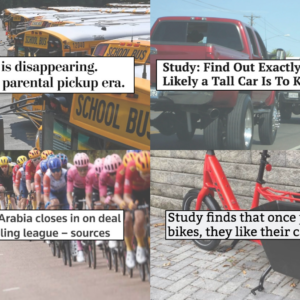
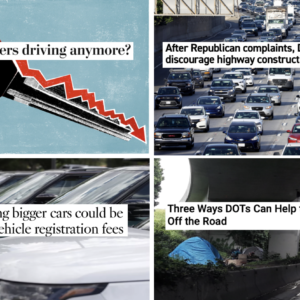
Thanks for reading.
BikePortland has served this community with independent community journalism since 2005. We rely on subscriptions from readers like you to survive. Your financial support is vital in keeping this valuable resource alive and well.
Please subscribe today to strengthen and expand our work.
“We don’t go to a neighborhood and say, do you want a fire station here or a fire hydrant,” Harris said. “But with Vision Zero, we’re still forced to go to a neighborhood and say, do you want the street safe or not? And then getting everybody’s feedback as if every neighborhood resident and every councilmember is a traffic engineer.”
Gosh, it must be awful to people get injured or die because of this kind of ridiculous approach to “community engagement.” Aren’t we lucky that nothing like that would ever happen here in Portland?!
Oh, wait, it’s not about good luck; it’s about bad judgement. And it sure is happening here.
I’m generally anti vandalism. I think the Portland riots in recent years have done otp irreparable harm to the city’s image. But the destruction of the automated taxi brings a smile to my face.
May they finish off the fleet! Reading that story was better than finding an Alex Singer for $20 at a yard sale.
Cost of (heavy) cars:
All the more reason to institute a weight/mile tax for private vehicles. The damage to roads and infrastructure from increasingly heavy motor vehicles needs to be paid for by the people that insist on using them.
I would argue for stricter driver certification to operate these vehicles as well, to help ensure that drivers are properly aware of the increased danger to other road users and are instructed how to minimize that danger.
It would follow that insurance for these large vehicles would be more expensive too, but that’s a free market decision, and not necessarily something that would need to be legislated.
You could probably quantify how much more dangerous these vehicles actually are by looking at comparable insurance premiums.
You would find that the size of the vehicle has little or no effect on what you pay for insurance. The actual vehicle is one of about 9 factors an insurance company uses to determine your rate. When they factor in the vehicle they use real world data on the number of claims, and the cost of repair. I give you some real-world examples. My 2005 F150 is my cheapest vehicle to insure. My most expensive is my 2023 Subaru Forester by more than double. Part of that is the F150 is classified as Pleasure/Personal vs Commute for the Forester. Even though my Forester has all the modern safety features included with EyeSight® that make it a safer vehicle. These also increase the cost of repair. My wife’s 2009 Forester which also classified as Pleasure/Personal is slightly higher than the F150. The 2nd example is when my son from his used 2006 WRX (3000 lb. car) to a new Jeep Gladiator (4500 lb. pickup) his insurance decreased. Of course, the WRX and STI are voted most likely to be found wrapped around a telephone pole by insurance adjusters. I also found on average my nephews 3500 GMC Sierra is cheaper to insure than my F150.
It sounds like you are comparing comprehensive coverage, not just liability coverage, which is where I would expect the risk-to-others-premium to show up.
The numbers I used for comparison is based on Full coverage not just comprehensive. And when I talk about full coverage that includes Liability, Uninsured/Underinsured, Personal Injury Protection, Uninsured Motorist Property Damage, Comprehensive and Collision. Much of auto insurance is base on the driver (driving record and claims). Cost of Comprehensive and Collision is based upon parts and labor models to repair the vehicle. I would say that there is a multiplier on each vehicle that is determined by the number of claims of said vehicle (Statistical Data). Which is why it is cheaper to insure a Heavy Duty Pickup than a Half Ton. On one list I found it showed that the Toyota Tacoma was the most expensive Pickup to insure. According to Forbes the most expensive vehicle to insure is the Tesla Model S Performance.
https://www.forbes.com/advisor/car-insurance/most-least-expensive-cars-to-insure/
As you posted “liability coverage, which is where I would expect the risk-to-others-premium to show up” is true, but liability is based on the driver not the vehicle.
Of course to compare liability rates you’d have to hold the driver constant.
The thesis we’re talking about is that some vehicles are notably more dangerous to people outside the vehicle than others. If one vehicle creates more hazard, liability claims against drivers of those vehicles should be higher. We cannot compare rates for your F250 with mine for a Chevy Volt; but we might be able to compare rates for those two vehicles with me as the driver in both.
Wouldn’t you expect insurers to charge more to provide liability coverage for the F250 if it really presents a larger threat to people around it than the Chevy? And shouldn’t that difference (collectively, over a large pool of locations and drivers) help us compare the risk presented by each vehicle?
So I give you an example based on the 3 vehicles I have insured. Just looking at the Bodily Injury & Property Damage Liability part of my Insurance and I have the same Liability coverage on all my vehicles. My 2006 F150 is the least expensive. My 2009 Subaru Forester is $10.00 more (per 6 months) and my 2023 Forester is $3.00 more than the 2009 Forester. So because my F150 is taller and heaver than my other vehicles you think the Liability coverage should cost more. But it doesn’t. What bothers me is my 2023 has all the modern safety features such as auto braking, backup camera, blind spot detection and so forth but yet I pay we bit more for Liability on it. So my statement that “liability is based on the driver not the vehicle” is not totally true. But because the difference between the three vehicles is so small that the driver(s) is the majority factor when it comes to how liability cost is calculated.
The rates you cited are so close to one another as to be basically indistinguishable.
That leaves two possibilities. The first is that liability rates do not reflect the the underlying risk of higher damages caused by a more dangerous vehicle (it’s the driver not the vehicle). The second is that your F150 doesn’t actually create more expensive claims than your Forester, from which it follows that it isn’t as “more dangerous” in practice as you suspect.
Actually, higher insurance costs for large and heavy vehicles should be legislated, in the form of much higher levels of minimum coverage required.
Rates don’t need to be legislated. Insurance exists to protect people you might hurt or whose property you damage. Premiums reflect the risk of payout, and insurance companies are best positioned to know what that is and to mitigate against it.
You missed my point.
Heavier, larger vehicles should be required to carry higher levels of liability coverage. Our minimum liability limits are far too low for any motor vehicle.
Oregon should legislate higher liability minimums for oversized private vehicles, which would lead to higher insurance rates. I didn’t mean that Oregon should force insurers to charge more for a given level of liability coverage.
I 100% agree*.
*Assuming there is data indicating such an increase would help people get better settlements; it could in fact be harmful if it causes more drivers to let their policies lapse.
Mr Transit Speaks: Greensboro NC recently hired Jarret Walker to help redesign our transit system here (good luck to him and his staff dealing with a particular city councilor here and our 1948 system). His following quote describes Greensboro:
That Tesla story is so disturbing. What an absolute coward.
We didn’t sign up for your Beta test, bro.
I’m sorry, but the “free to walk” anti-jaywalking policy is dumb. They say there is no data that the laws makes people safer here but there is data about traffic deaths for people not crossing in the crosswalk, and there seem to be many just from reading the stories.
Additionally, they try to make it about climate change (what?) and how warrant checks are bad (what?!). If folks with warrants are out there, we should be finding them. Those warrants could be for selling fentanyl, sexual assault, or a million other nasty things.
There’s a difference between the safety or wisdom of some behavior and the effectiveness of trying to enforce it by policing.
If warrant checks are actually good then… what’s good for the goose is good for the gander. Would we want random warrant-check checkpoints on popular sidewalks and highways? When entering transit vehicles (not just for fare-dodgers but for all passengers)? If jaywalking enforcement is just a ruse to manufacture cause/suspicion to ID and warrant-check a visibly poor person that’s an equity problem. It’s something we have to protect against proactively because the majority of people that aren’t affected by it (not because we don’t jaywalk, but because we won’t be targeted because we’re not visibly poor) will look the other way when it happens.
People who fear police harassment while walking are more likely to drive instead. Cars are a major source of greenhouse gas emissions that cause climate change. Hope this helps.